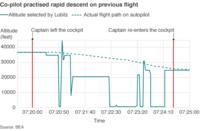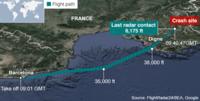
The co-pilot of the Germanwings plane that crashed in the French Alps in March may have practised a rapid descent on a previous flight, a report by French investigators has said.
The report said Andreas Lubitz repeatedly set the plane for an unauthorised descent earlier that day.
Lubitz is suspected of deliberately crashing the Airbus 320, killing all 150 people on board.
He had locked the flight captain out of the cockpit.
The plane had been flying from Barcelona to Duesseldorf on 24 March.
The alteration of the settings occurred on the plane's outbound flight from Duesseldorf to Barcelona on the same day, the report by accident investigation agency BEA said.

Analysis: Hugh Schofield, BBC News, Paris
If Andreas Lubitz "practised a rapid descent" on the outward leg of the Germanwings flight, then the obvious question is why did no-one spot it and ground him in Barcelona?
The interim French investigation report explains that puzzle. Over the course of three or four minutes, Lubitz did indeed designate "100ft" as the selected flight level. He did this several times, while the pilot was out of the cockpit.
But this was just after the plane had already begun its descent. After each occasion that he chose "100ft" he then corrected himself and entered the correct flight level. The course of the plane was not altered at all.
The picture that builds up is of a man steeling himself for the challenge he has set himself, building up the courage but at each point pulling back - until finally the pilot re-enters the cockpit and normality returns.
Had the return flight not crashed no-one would have noticed these anomalies on the outward journey.

It added that on several occasions - again with the captain out of the cockpit - the altitude dial was set to 100ft (30m), the lowest possible reading, despite instructions by air traffic control in Bordeaux to set it to 35,000ft and then 21,000ft.
It was also reset on one occasion to 49,000ft, the maximum altitude.
The changes apparently happened over a five-minute period at about 07:30 on the day of the crash, starting 30 seconds after the captain left the cockpit.
"I can't speculate on what was happening inside his head - all I can say is that he changed this button to the minimum setting of 100ft and he did it several times," BEA director Remy Jouty told Reuters news agency.


Five minutes on the Duesseldorf-Barcelona flight
07:19:59 - Noises corresponding to captain leaving cockpit
07:20:29 - Plane told by air traffic control to descend to 35,000ft
07:20:50 - Selected altitude changed to 100ft, increased to 49,000ft then returned to 35,000ft
07:21:10 - Plane told to descend to 21,000ft
07:22:27 - Selected altitude changes to 100ft several times
07:24:29 - Noises corresponding to captain returning to cockpit

The outward flight left Duesseldorf at 06:01, arriving in Barcelona at 07:57.
The co-pilot is known to have suffered depression in the past.
Last month, German prosecutors revealed that Lubitz had researched suicide methods and the security of cockpit doors.
Voice recorder findings suggest he locked the pilot out of the cockpit on the doomed flight.
BEA is expected to release its final report in a year.


Were you on the outbound Duesseldorf to Barcelona flight in March? Have you been affected by the issues raised in this story? You can emailhaveyoursay@bbc.co.ukwith your comments.
Or Whatsapp +44 (0) 7525 900 971
Or comment here
0 comments:
Post a Comment